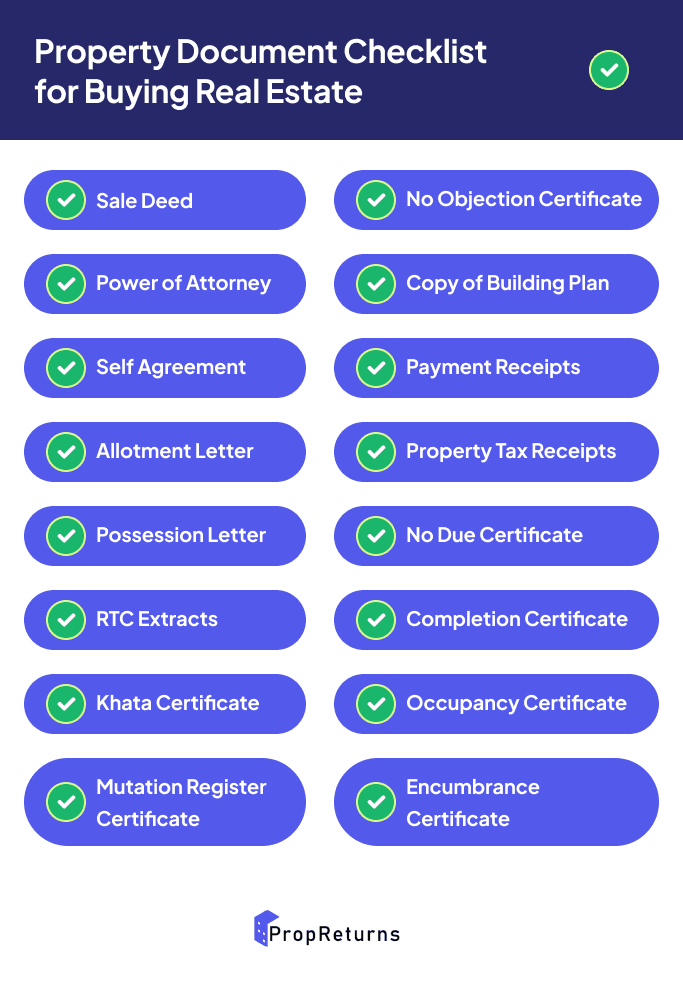If you're in the process of purchasing a property, you've likely realized that it involves more than just finding the perfect home or land. Property documents are a crucial aspect of any property purchase, providing the necessary legal framework to protect your rights and ensure a smooth transaction. These property documents serve as the foundation of the purchase, outlining the terms, conditions, and legal obligations of both the buyer and the seller.
From purchase agreements to title deeds, understanding the legal documents involved is essential to safeguarding your investment. In this article, we will explore the legal documents required for the purchase of property, with examples to illustrate their importance in the buying process. So, let's take a closer look at the legal documents required for the purchase of property and which you need to be familiar with!
Complete property documents list:

Let us have a look at the complete property documents checklist:
Sale deed
A Sale Deed is a legal property document used in real estate transactions that transfers ownership of a property from the seller to the buyer. It serves as proof of the sale and purchase of the property and outlines the terms and conditions of the sale.
Power of Attorney
A Power of Attorney (POA) is a legal document that grants authority from one person (the principal or grantor) to another person (the agent or attorney-in-fact) to act on their behalf in various legal, financial, or personal matters. The principal delegates certain powers and responsibilities to the agent, who can then act as the principal's representative and make decisions or take actions on their behalf.
No Objection Certificate
A No Objection Certificate (NOC) is a legal document issued by an individual or an organization that states that they have no objection or objection-free status in relation to a particular matter or request. It is commonly used in various situations where one party seeks permission or clearance from another party to undertake a specific action or transaction.
Sale Agreement
A Sale Agreement is a legally binding contract between a buyer and a seller that outlines the terms and conditions for the sale of a property or goods. It serves as a formal agreement that establishes the mutual understanding and agreement between the parties regarding the sale transaction.
Allotment letter
An Allotment Letter is a document issued by a company or an organization to an individual or entity that confirms the allocation or allotment of shares, units, or any other form of securities as part of an investment or subscription agreement. It serves as evidence of the ownership or investment in the company or organization.
Possession letter
A Possession Letter, also known as a Possession Certificate or Possession Confirmation, is a document issued by a builder or developer to a buyer or allottee of a property, confirming that the possession of the property has been handed over to the buyer or allottee. It serves as evidence that the buyer or allottee has taken physical possession of the property.
RTC extracts
RTC extracts typically refer to "Record of Rights, Tenancy, and Crops" extracts. RTC extracts are official land revenue records maintained by the government in some regions, particularly in India, to document the ownership, tenancy, and cultivation details of agricultural land. RTC extracts are important documents that provide information about the status and history of a particular agricultural land parcel.
Khata certificate
A Khata Certificate is a document issued by the local municipal corporation or civic authority in some regions, particularly in India, as proof of property ownership for a particular property within their jurisdiction. It is an official document that confirms the existence of a property and its ownership as per the records maintained by the local civic authority.
Mutation register certificate
A Mutation Register Certificate, also known as a Mutation Extract or Mutation Certificate, is an official document issued by the local revenue or land administration department in some regions, particularly in India, to record changes in the ownership or other details of a property in the revenue records maintained by the government.
Copy of building plan
A copy of a building plan refers to a duplicate or replica of the original building plan or blueprint that has been submitted and approved by the local building or construction authority for a particular construction project. It typically includes detailed drawings, specifications, and other technical documents that outline the design, layout, dimensions, and specifications of a building or structure.
Payment receipts
Payment receipts refer to documents or written acknowledgments that confirm the receipt of payment from a customer or client for goods, services, or other transactions. They serve as evidence of payment and typically include details such as the date, amount, mode of payment, and description of the goods or services for which the payment was made.
Property tax receipts
A property tax receipt is a document or written acknowledgment issued by the local government or tax authority to confirm the payment of property taxes by a property owner. It serves as evidence that the property taxes for a particular property have been paid for a specific period.
Encumbrance certificate
An encumbrance certificate is a legal document that provides information about any existing encumbrances or charges on a property. It is typically issued by the Registrar of Sub-Assurances or Sub-registrar's office, which is responsible for maintaining property registration records in a particular jurisdiction. An encumbrance certificate is commonly used in real estate transactions to verify the ownership and title status of a property.
No due certificate
A no-due certificate or clearance certificate is a document issued by an individual, organization, or authority to confirm that there are no outstanding dues, liabilities, or objections against a particular party or entity. It is commonly used in various financial, legal, or administrative transactions to certify that a party has cleared all its obligations or is free from any encumbrances.
Completion certificate
A completion certificate is a document issued by a local government or regulatory authority to certify that a construction project has been completed in accordance with the approved plans, specifications, and building codes. It serves as evidence that the construction work has been completed satisfactorily and in compliance with the relevant regulations and standards.
Occupancy certificate
An occupancy certificate is a document issued by a local government or regulatory authority to certify that a building or structure is safe, habitable, and compliant with the approved plans, specifications, and building codes, and is suitable for occupancy by its intended occupants.
Conclusion
Purchasing a property involves more than just finding your dream home or land. It involves answering important questions like how to check property documents. It also requires a thorough understanding of the legal documents involved in the process. These documents serve as the legal framework for the purchase, protecting your rights as a buyer and ensuring a smooth transaction.
Being knowledgeable about these legal property documents is crucial to making informed decisions and safeguarding your investment. So, before you embark on your property purchase journey, take the time to familiarize yourself with the property documents required and seek professional advice if needed. With proper understanding and attention to detail, you can confidently navigate the legal aspects of property ownership and embark on your new adventure as a property owner!
